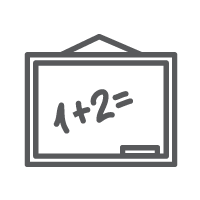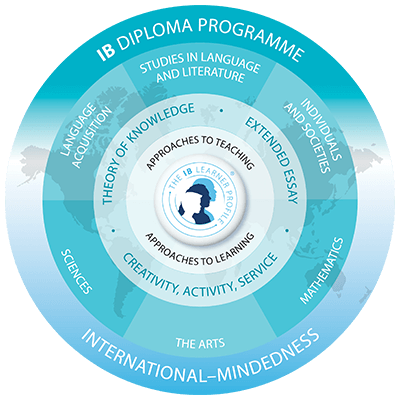The six subject groups are:
- Studies in English language and literature
- Language acquisition – Spanish
- Individuals and societies – Psychology
- Sciences – Physics
- Mathematics – Applications and Interpretation
- The arts – Visual Arts
The six subject groups are:
- Studies in English language and literature
- Language acquisition – Spanish
- Individuals and societies – Psychology
- Sciences – Physics
- Mathematics – Applications and Interpretations
- The arts – Visual Arts
Theory of knowledge
Theory of knowledge
Theory of knowledge (TOK) is assessed through an oral presentation and a 1,600 word essay. It asks students to reflect on the nature of knowledge, and on how we know what we claim to know. TOK provides application to real world situations asking questions like What is knowledge?, Who owns knowledge?, What are the limits of knowledge?, and How can we use knowledge? These types of questions give students a frame of reference when deciding on the topic of personal interest that they will choose for their extended essay.Extended Essay
Extended Essay
The extended essay, which is an independent, self-directed piece of research, finishing with a 4,000-word paper. It provides practical preparation for undergraduate research and an opportunity for students to investigate a topic of personal interest to them. This essay illustrates the students ability to explore, reflect on their knowledge and go further through inquiry to investigate a real world issue and develop an argument that provides answers to defend their position. Students are supported throughout the process of researching and writing the extended essay, with advice and guidance from our DP supervisor.Creativity, activity, service (CAS)
Creativity, activity, service (CAS)
Studied throughout the Diploma Programme, CAS involves students in a range of activities alongside their academic studies. This is not formally assessed, but rather an opportunity for students to understand the learning outcomes of creative thinking, physical exertion contributing to a healthy lifestyle beyond their academic work. The three strands of CAS, which are often interwoven with particular activities, are characterized as follows:
• Creativity – arts, and other experiences that involve creative thinking.
• Activity – physical exertion contributing to a healthy lifestyle, complementing academic work elsewhere in the DP.
• Service – an unpaid and voluntary exchange that has a learning benefit for the student. The rights, dignity and autonomy of all those involved are respected.

About DP
The Diploma Programme aims to develop students who have excellent breadth and depth of knowledge

Field Trips & Outreach
MDIS students participate in field trips and/or outreach programs about 6 times per year.

Student Life
We offer a wide range of activities that are individualized and personalized to the interests of our student body.

